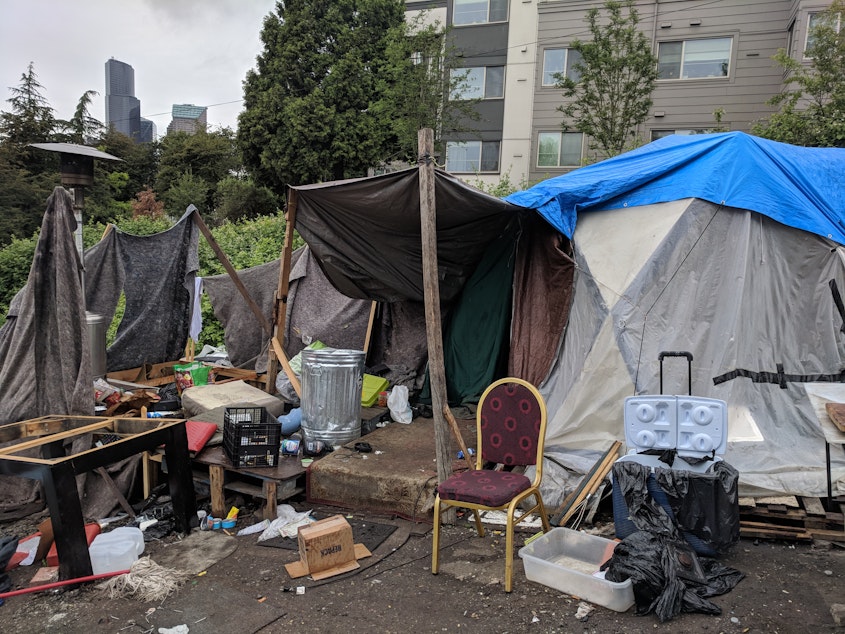Is city of Seattle getting tougher with those tent camp sweeps?

A drug bust saw Seattle police serve warrants at two tent camps and arrest 10 people, and that led to a sweep of the camps this week. Does this signal a new public safety approach at City Hall?
Joni Balter with Seattle Channel's “Civic Cocktail” and Q13 political analyst C.R. Douglas joined KUOW’s Angela King to take a look.
Joni Balter: The reason it's different to me anyway is how coordinated so many different city agencies were and what was really different about it also is that criminality is the reason for clearing the camp. We have to be very careful when we talk about this. What police found there were criminal elements at these two locations but it's really unfair to say that everybody in there is participating.
Angela King: So is this an isolated event, C.R., in your mind?
C.R. Douglas: It seems to be a more aggressive approach. We’ll know going forward if it's a trend. It is different in the respect that the SPD is really leading this one. That's probably what you're going to see more going forward. It is easier to get rid of an encampment under the justification of reducing criminality and illegality. Imagine the uproar there would have been if that element had not been there. As of now the reactions been pretty muted.
Balter: I'm not trying to promote “Seattle is Dying,” the documentary from KOMO, but we are at a very tough crunch point between compassion for homeless people and a sense that lawless people are on the streets and causing mayhem. I just happened to see some poll numbers here on [Mayor] Jenny Durkan. Her approval numbers in say February were around 61% this last month about two weeks ago 53%. People are still making up their minds about Jenny Durkan.
Sponsored
Douglas: It's the No. 1 concern among voters. And I think Joni is right that “Seattle Is Dying” documentary was a huge turning point. That was this primetime KOMO special — very sensational, admittedly biased, but it hit a nerve. You can't have three and a half million people view that documentary, which are the numbers so far, and not have it changed the approach to City Hall. I think that's what's going on here.
King: So do you think this is just a flash in the pan, given what we saw with the documentary, or do you think this is going to last longer?
Douglas: I suspect it'll last because the public is demanding it if you just look at poll numbers. I think the street view of the problem will look different if these patrols continue and they use criminality to kind of justify them. I doubt however that the larger problem will get much solved. I think the driver behind the chronic street folks, those who live in the encampments, is drug and alcohol abuse. I mean, yes, there's mental health but I don't think it's as widespread. And many of the mental health problems are exacerbated by the drug and alcohol problems. So until we get a solution to that, I doubt that's going to change much.
King: And that's why some cities have emphasized shelter first because when you don't have shelter you cannot easily deal with all your other problems.
Douglas: Just look at what it takes in a normal functioning family that lives in a nice neighborhood with kids and dogs and all the rest to do an intervention of a family member who has some addiction problems. I mean that is tough, very tough, and often not successful. Look at the homeless population, with all the other problems going on, with no family support largely, with strangers or social workers trying to do the intervention. I mean it is very, very difficult. And until we get that piece better, it’s going to be a problem.





